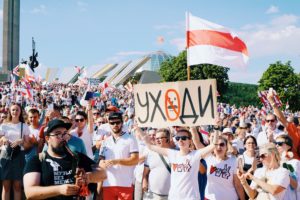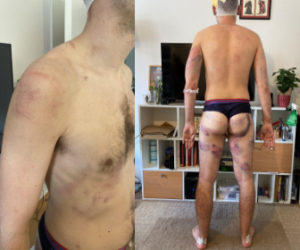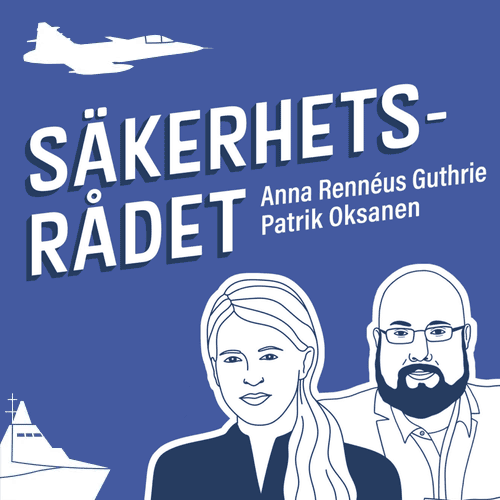This article is part of the Let The World Hear Project, which is a collaboration between Stockholm Free World Forum’s webzine Säkerhetsrådet and a number of Belarusian volunteers. Together we have gathered stories from victims of the dictatorship regime in 2020. The world must know what happened.
Read more about the project here.
Yauhen, 25: ”This is a friend’s story of what happened to him on the night of 11-12 August 2020. I can confirm the authenticity of the source”.

Protesters chant ”Leave!” in Minsk. Photo: Artem Podrez/Pexels
There were about 300 people around me. Two black minibuses from the Almaz Special Forces came up and parked beside us. I also noticed an approaching convoy of special vehicles – at least six avtozaks with OMON police officers. The OMON and the Almaz started to run towards us at the same time. We realized that we were surrounded on three sides and began to run towards where it seemed clear. Soon we noticed another group of Special Forces in front of us, with machine guns and wearing helmets. They would just stop cars at random, break doors and smash windows. They would point weapons at people, force them to kneel. We understood that we had nowhere to run.
I hid in a secluded place. It was covered with billboards on all sides. But in one place there was a clear area without any advertising. I looked through this open area and saw a man on his knees while a soldier was beating him up. The man fell, but the soldier continued to beat him. He then bent down, said something to the man on the ground and then raised his head. And that’s when our eyes met. Signalling with his forefinger, he told me to “get over here.”
It was the most frightening moment of the evening. I realized that I was finished.
They beat me up and tied my hands behind my back. After that, three Special Forces soldiers took me around the corner and said, “We are now putting a grenade in your pants, if we take out the pin, you explode, and we will say that you blew up on an unidentified explosive device.” They put a combat grenade inside my underwear and ran to the side. Then they returned, beat me up again and took me back. Pieces of my teeth chipped off because I was forced to carry my backpack in my mouth. If the backpack fell, they would beat me up; when I lifted it they would continue to beat me. They beat me constantly.
They put me in an avtozak, between a whole bunch of other people, around 20 in total. We were lying on top of each other. From time to time we were beaten. If you complained about something, they would hit you an extra time. A man said, “I have asthma, I am suffocating.” The Special Forces soldier approached him, put a foot on his throat and began to choke him while saying, “You can die, we don’t care”.
At some point I was taken out of the avtozak and moved to another. Inside, two commandos were standing on each side. They forced my face down on the floor and beat my legs for a few minutes; my legs became very swollen. I was then brought back to the first avtozak and we drove away. Half the time the foot of a riot police officer was on my neck. If you lifted your face off the ground, even an inch, they would start to beat you.
I had neither my passport nor my phone with me. Phones were taken from those who had them and the soldiers tried to unlock them. If you didn’t say the password, they smashed your phone. One young man was asked for the password, but he refused to give it. They stripped him naked and said, “If you don’t tell us the password, we will rape you with these sticks”. The young man gave them the password and they started to go through his Telegram channels.
There were a couple of girls, around 18 years old. Their crime was that whenever someone felt bad, they would pay attention to it. The riot police came up and began to insult them, along the lines of “You corrupt whores”. One girl answered back so they shaved off a section of her hair. “If you don’t shut up, we will take you to the detention centre and put you in a cell with men. You will be raped there, and then we will take you out to the forest. This is how your story ends”. Girls got beaten much less than guys. Guys were beaten very hard; there were no limits. The soldiers and the police would beat them with their fists, feet, sticks. When we were put up against the wall, we were simply hit with our heads against the wall.
We were brought to a transfer point where people were reloaded into other cars going to the detention centre. We were taken out of the avtozak. Well, they beat you and you just ran. There was a corridor with about 40 people, 20 on each side. When you ran through, everyone would beat you. They aimed for our heads, groins and legs so that we fell; then they would beat us until we got back up. At the end, they grabbed me by the arms and legs and threw me onto a bus.
I believe that it was Russian special forces who dealt with us. I was wearing a t-shirt saying “Freedom to Sentsov”, which refers to a Ukranian film director who was accused of terrorism by Russian authorities in 2014. They reacted to this t-shirt with, “Alright, so you are also against Russia.” They spoke with a Russian accent and addressed us with, “You, Belarusians”, thus separating themselves from us. “You have such a great batska [Lukashenka’s nickname, meaning ”daddy]” what is it that you don’t like?”. Belarusians don’t say things like that.
They used both rubber truncheons as well as the ones with a metal rod inside. At the beginning they would beat us with the rubber ones. There was no option for resistance. You did what you were told. You were silent. You didn’t try to remind them about your rights. On the bus, a soldier came up to me, stood on me and then began to beat me on the head with this baton with a metal rod; after the first hit I felt almost nothing. He beat me for a while, then he left, and more people were put in layers on top of me. It was hard to breathe. It’s not clear whether it was best to lay above all the others, where they would beat you, or below, where you were suffocating.

After the beatings. Photo: private
They took us back through the corridor to the avtozak. The avtozaks have small cells inside designed for three people. There were eight people crammed into each . I was pressed against the wall and I saw blood streaming down from it. I hadn’t realized that my head was bleeding, as I hadn’t felt any pain. It was very crowded and I began to lose consciousness. I passed out several times.
When we arrived at the detention centre and they opened the door of the avtozak, I just fell out. They said, “Oh, looks like this one is done.” They grabbed me by the neck and threw me out, dragged me along the ground and left me on the grass. My head was bleeding, my whole body was blue. I couldn’t move and kept losing consciousness from time to time. I started to feel sick and saliva was pouring out of my mouth. They dropped the phrase, “Oh, and this one is also on drugs.” At some point, I started to shake.
The doctor said that since I was unconscious, they shouldn’t beat me again. Everyone else was forced to kneel and continued to be beaten. The activists and those who, in the authorities’ opinion, had been organizing the protests were marked with red paint, separated and taken away. Screaming and groaning was constantly echoing around the detention centre. There is a rumour that there are special torture chambers where people are beaten until they lose consciousness; I think it’s true.
There are a lot of wounded in the hospitals with bullet wounds, cuts and fractures. There are not enough doctors. I was lucky that the ambulance picked me up from the detention centre. It is a concentration camp where people are being tortured.
The story was originally told to and translated by Anastacia S.
